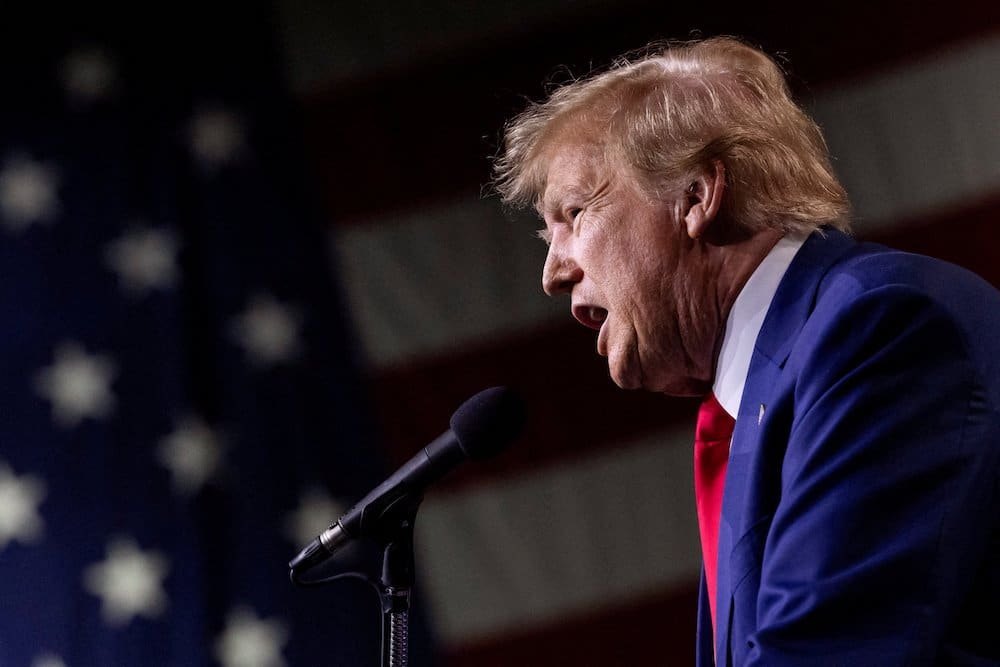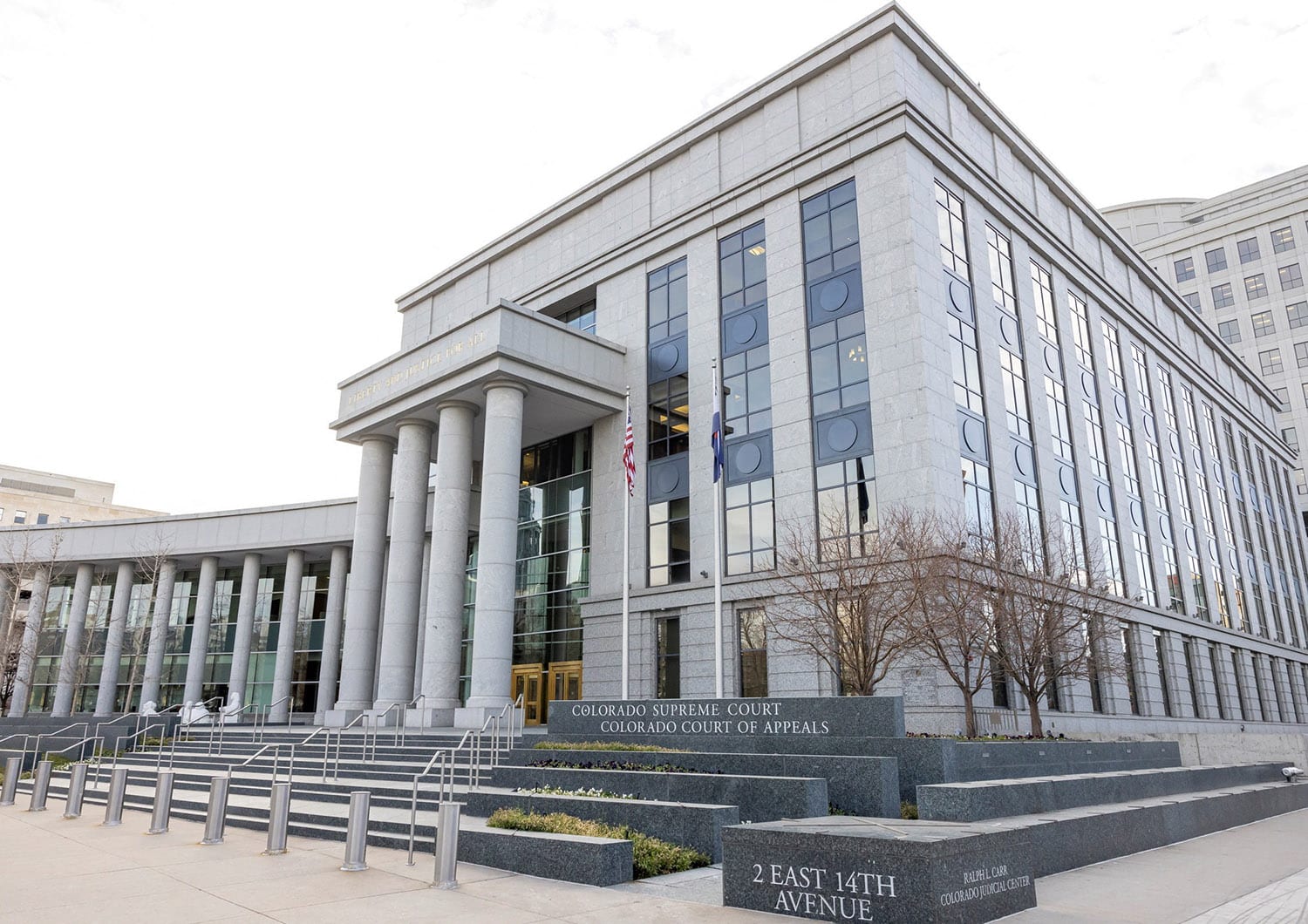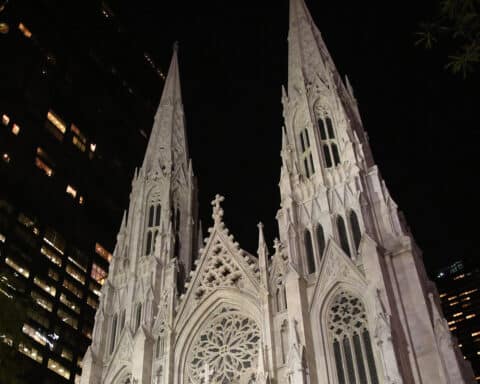(OSV News) — The Colorado Supreme Court on Dec. 19 found former President Donald Trump ineligible for the White House under the U.S. Constitution and removed him from the state’s presidential primary ballot, setting up a likely review by the U.S. Supreme Court.
In Washington this week, the White House announced Vice President Kamala Harris will tour the country next year to host events in support of expanding abortion access. Congressional lawmakers will continue their negotiations on an emergency aid bill for Ukraine and Israel in the new year as they failed to reach an agreement before their holiday recess as Republicans seek changes to U.S.-Mexico border policy in order to provide that aid.
Trump ineligible in Colorado
Colorado’s high court held in a 4-3 decision “that Trump is disqualified from holding the office of president under Section 3 of the 14th Amendment.”
The justices’ decision overturned a ruling from a district court judge who found that Trump incited an insurrection for his role in the Jan. 6, 2021, riot at the U.S. Capitol, in which supporters of the then-president attempted to thwart the certification of President Joe Biden’s victory in the 2020 election. But the lower court judge had found Trump could not be barred from the ballot because it was unclear whether the provision includes the presidency.
The Civil War-era provision in question was designed to keep former Confederates from returning to government following their rebellion against the United States.

The Colorado Supreme Court stayed its decision until Jan. 4, so that the U.S. Supreme Court could review the matter. Jan. 5 is the state’s deadline for primary ballot access.
“We do not reach these conclusions lightly,” the majority of the Colorado Supreme Court wrote in its ruling. “We are mindful of the magnitude and weight of the questions now before us. We are likewise mindful of our solemn duty to apply the law, without fear or favor, and without being swayed by public reaction to the decisions that the law mandates we reach.”
Other similar lawsuits have been filed against Trump across the country.
Bob Spagnola, a professor of business and leadership at the Jesuit-run Regis University in Denver, told OSV News that “this is an historical holding.”
“Never in the history of our country has a presidential candidate been excluded from the ballot under Section 3 of the 14th Amendment,” Spagnola said.
Up to the Supreme Court
Robert Schmuhl, professor emeritus of American studies at the University of Notre Dame in South Bend, Indiana, who critically observes the modern American presidency, told OSV News that “the decision by the Colorado Supreme Court could lead to a monumental ruling by the U.S. Supreme Court.”
“Judicial interpretation of such enormous consequence will undoubtedly lead to people of different viewpoints making their own political interpretation of the justices,” Schmuhl said. “The reputation of the high court and the extent to which it’s considered a fair, trusted arbiter of the Constitution will be under a microscope, whatever the judgment might be.”
Spagnola added there is a question as to “whether the events of Jan. 6 constituted an ‘insurrection’ or whether Mr. Trump ‘engaged’ in it.”
“I am also sure the Supreme Court justices can find a number of interpretations to Section 3’s ambiguous language about ‘officers of the United States’ that will also give them an argument for overturning the ruling,” he said.
Trump faces a slew of felony charges in four separate criminal cases related to his alleged attempts to overturn the 2020 election and his mishandling of classified documents, among other misconduct. But the specific charge of insurrection has not been among them to date.
In a Dec. 19 statement, Steven Cheung, a spokesman for the Trump campaign, said, “Democrat Party leaders are in a state of paranoia over the growing, dominant lead President Trump has amassed in the polls.”
Cheung said the court’s decision was “completely flawed” and that the campaign would appeal.
“We have full confidence that the U.S. Supreme Court will quickly rule in our favor and finally put an end to these unAmerican lawsuits,” he said.
Harris to go on tour for abortion access
Vice President Kamala Harris will go on a nationwide “reproductive freedoms tour” next year, the White House announced. The move comes as the Biden-Harris reelection campaign seeks to make abortion access a key issue of the 2024 race.
Harris will “continue fighting back against extreme attacks throughout America,” the announcement said. Harris’ first top will be in Wisconsin on Jan. 22, the anniversary of the now-overturned 1973 Roe. v. Wade decision, which had declared abortion to be a constitutional right. The U.S. Supreme Court returned the matter of regulating or restricting abortion back to the legislative branch in its 2022 Dobbs v. Jackson Women’s Health Organization decision.
“Extremists across our country continue to wage a full-on attack against hard-won, hard-fought freedoms as they push their radical policies — from banning abortion in all 50 states and criminalizing doctors, to forcing women to travel out of state in order to get the care they need,” Harris said in a statement. “I will continue to fight for our fundamental freedoms while bringing together those throughout America who agree that every woman should have the right to make decisions about her own body — not the government.”
There will likely be additional ballot measures on abortion amid next year’s presidential election. The U.S. Supreme Court also recently took up its first major abortion case post-Dobbs concerning a challenge to mifepristone, an abortion-inducing drug. A decision is expected next summer in the midst of the presidential campaign.
Asked in an interview with OSV News about his priorities for 2024, Bishop Michael F. Burbidge of Arlington, Virginia, the chairman of the U.S. Conference of Catholic Bishops’ Committee on Pro-Life Activities, said, “we have seen this past year that our work is just beginning.”
“There is so much at stake,” Bishop Burbidge said, adding, “What has become clear in these ballot initiatives and the ones that we’re anticipating is that we have to continue to find effective means of inspiring, of conveying the truth and begin to strategize in a way that these ballot initiatives will be pro-life.”
Congress fails to reach agreements
Ongoing negotiations on a bill tying aid for Ukraine and Israel to U.S. border policy puts some Catholic priorities at odds. Some Catholic immigration activists have raised alarm about the potential changes to border policy, while some Catholics have called for continued funding of Ukraine’s defense against Russia’s invasion, noting the Catholic Church is already facing persecution in Russian-occupied Ukraine.
“Our negotiators are going to be working very, very diligently over the December and January break period, and our goal is to get something done as soon as we get back,” Senate Majority Leader Chuck Schumer, D-N.Y., told reporters Dec. 19.
In a joint statement, Schumer and Senate Minority Leader Mitch McConnell, R-Ky., said their Senate colleagues “are making encouraging progress” but that “challenging issues remain.”
“(W)e are committed to addressing needs at the southern border and to helping allies and partners confront serious threats in Israel, Ukraine and the Indo-Pacific,” the pair said in a written statement. “The Senate will not let these national security challenges go unanswered. As negotiators work through remaining issues, it is our hope that their efforts will allow the Senate to take swift action on the national security supplemental early in the new year. In the time remaining this year, Senate and Administration negotiators will continue to work in good faith toward finalizing their agreement.”
The Pentagon has warned that it runs out of money to supply Ukraine’s military with weapons on Dec. 30 unless Congress approves new funding.





